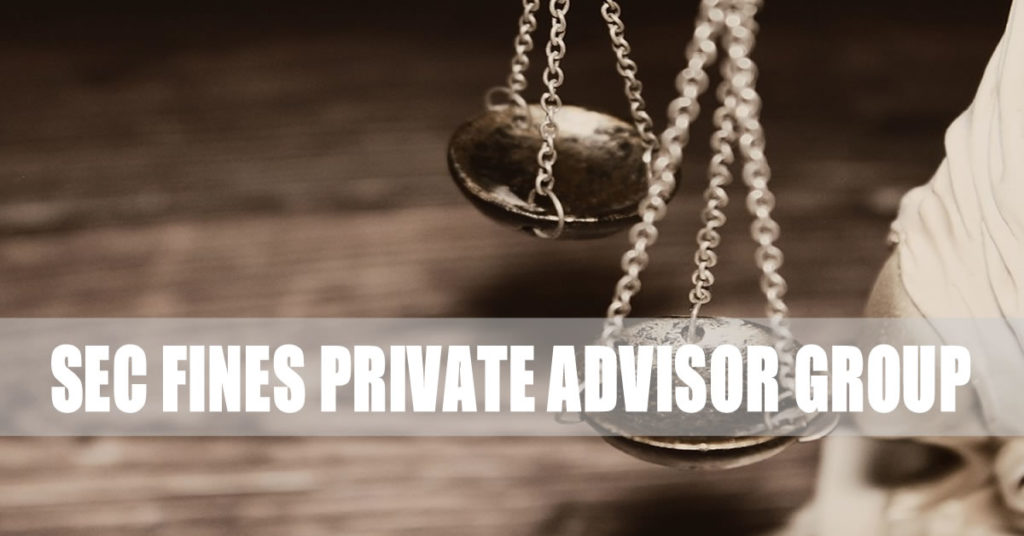The United States Securities and Exchange Commission (SEC) announced on Friday that it has imposed a fine against Private Advisor Group in the amount of $5.8 million because the company advised clients to invest in high-fee mutual funds and failed to disclose any conflicts of interest that were associated with those recommendations.
Both broker-dealers and financial advisors are required to disclose any conflicts of interest to clients and do what is best for the client. This includes commissions and fees. Often financial advisors can put clients in lower-cost mutual funds but in more expensive ones because the advisor is paid a higher commission.
Haselkorn & Thibaut, P.A., fights for investors nationwide and is actively investigating financial advisors and broker-dealers like Private Advisor Group on the sale of investment products in regards to commissions and disclosing conflicts of interests. Investors are encouraged to call our toll-free number at 1-888-614-9356 for a free consultation.
The SEC made the allegation that the company had invested customer money in mutual funds that impose 12b-1 fees beginning in July of 2014. According to an order that was released on Thursday, the money was utilized in wrap accounts at Private Advisor Group, which allowed the company to deduct transaction costs from the pay it provided to its investment adviser representatives.
However, the company, which is the biggest affiliated branch office of LPL Financial, was able to avoid transaction fees by acquiring mutual funds that imposed 12b-1 fees. The investors were responsible for covering the expenses of these fees. The SEC stated that clients of Private Advisor Group’s clearing business had access to lower-cost share classes of the same fund for a transaction charge. These share classes were offered by the same fund. According to the SEC, Private Advisor Group did not receive any compensation under the 12b-1 program.
According to the order issued by the SEC, the company “failed to disclose the conflicts of interest that arose from the decision to invest wrap program client assets in [no-transaction-fee] shares — where PAG, and ultimately its IARs, avoided paying transaction fees — over lower-cost [transaction-fee] shares of the same mutual funds.” These “conflicts of interest” arose because the firm “decided to invest wrap program client assets in [n
The SEC also came to the conclusion that the company violated its fiduciary duty of care when it failed to provide the best execution for its customers by recommending the high-cost mutual fund share classes rather than the less costly share classes.
The Securities and Exchange Commission (SEC) has filed charges against Private Advisor Group alleging that the firm violated anti-fraud and compliance provisions of the Investment Advisers Act.
The cease-and-desist order, the censure, and the $5.8 million punishment that would be handed to investors were all agreed upon by Private Advisor Group. The company did not confirm nor refute the conclusions presented by the SEC.
Inadequate disclosures about the recommendations of high-fee mutual funds have been the focus of the SEC’s enforcement action, which is the most recent development in the agency’s years-long drive to crack down on the issue. In addition, accusations of best execution have been brought forth by the SEC over the course of the past few months.
In a statement, a spokesperson for the company named Kelly Coulter explained that the company had reached an agreement with the Securities and Exchange Commission (SEC) to settle a dispute over the disclosure of certain historical practices. This was done as part of an ongoing initiative to review the share classes of mutual funds. “We are relieved to put this subject in the past,” they said.
According to the order from the SEC, the company stopped allowing clients to buy mutual funds with 12b-1 fees in wrap fee accounts as of the beginning of the 2017 calendar year.
According to what Coulter indicated, the company mandates the purchase of the share class with the lowest price. “This criteria continues to be the standard-bearer for best practices in the industry.”
However, the SEC expressed concern that the change did not go far enough.
According to the decision issued by the SEC, “While these adjustments, when made, began to reduce the conflict of interest, when they were applied, they did not remove it and the conflict was never reported to customers.”
However, since the policy was revised in 2017, Coulter stated that the great bulk of the settlement sum that would be reimbursed to clients will cover the time period beginning in July 2014 and ending in December 2016.
Less than four percent of our active accounts will be eligible to obtain a credit of more than one hundred dollars, as Coulter explained, “to emphasize the historical nature of this issue.”


